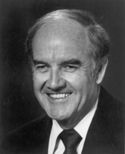George McGovern
 From Conservapedia - Reading time: 2 min
From Conservapedia - Reading time: 2 min
George McGovern (1922–2012) was a former university professor who became an outspoken liberal Democratic Congressman and Senator from the ordinarily conservative South Dakota.
A decorated World War II veteran, McGovern served in the United States Army Air Forces (USAAF) as a B-24 pilot. He flew 35 missions, earning the Distinguished Flying Cross. But as a leftist anti-war candidate who won the Democratic nomination for president in 1972, McGovern lost in a landslide against the incumbent Richard Nixon. In 1980, McGovern also lost reelection for the U.S. Senate in a landslide.
In the pre-Roe v. Wade days McGovern opposed abortion and tried to distance himself from extreme leftists who held that position in 1972. [1] McGovern was a parish pastor for a brief time and earned the nickname as the Preacher Politician. [2] His speeches resembled sermons and his moralizing style was inspired by an earlier another Midwest Plainsman, 3-time Democratic presidential nominee William Jennings Bryan.
Many liberals blamed McGovern's defeat on the fiasco surrounding his initial running mate, Thomas Eagleton. When it emerged that Eagleton had a history of disabilities and mental health treatment, McGovern initially stuck by his running mate, only to change his mind and force Eagleton off the ticket days later; Sargent Shriver was the eventual replacement running mate. However, McGovern had been behind Nixon in the polls for virtually the entire campaign - the Eagleton affair certainly didn't help McGovern and contributed to Nixon's lopsided win, but the real damage was done by McGovern's overly liberal (even by Democrat standards) viewpoints and policies, and failure to make clear what he would have done as president. The Democratic Party subsequently changed its procedures for nominating presidential candidates in order to give about one-third of the nominating (delegate) power to existing office-holders, in order to make it more difficult for a populist but unelectable candidate like McGovern to win the Democratic presidential nomination.
Despite his distinguished military record, McGovern was a notorious flip-flopper on military issues. He was an outspoken critic of U.S. involvement in Vietnam, once saying "I'm fed up to the ears with old men dreaming up wars for young men to die in." However, by 1978, McGovern was a leading advocate for U.S. military intervention in Cambodia. He was highly criticized for his inconsistent stance on foreign affairs. Some criticisms even implied that McGovern only condemned Pol Pot because he wasn't Ho Chi Minh and took power by force, while believing that Minh was "popularly elected."[3]
See also[edit]
References[edit]
- ↑ Dougherty, Richard, Goodbye, Mr. Christian: A Personal Account of McGovern's Rise and Fall, Garden City, New York: Doubleday & Company, 1973, pp. 97-100
- ↑ http://www.dailyherald.com/article/20121026/news/710269921/
- ↑ https://web.archive.org/web/20070426224740/https://canadafreepress.com/2007/walden041107.htm
 KSF
KSF